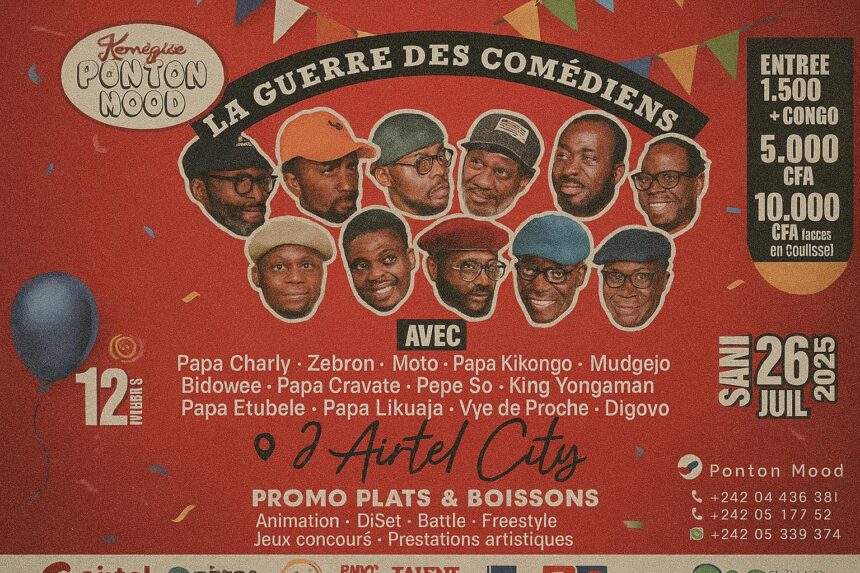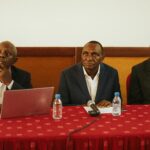A showcase shaped as friendly battle
On 26 July Airtel City will transform into an arena of laughter as Boost Company and Kermesse Ponton Mood stage “La Guerre des Comédiens”. Thirteen of Congo-Brazzaville’s most recognisable performers—among them Papa Charly, Zebron and King Yorogam—will exchange improvised jabs in a format inspired by North American roast culture yet adapted to Congolese idioms. Scheduled DJ sets, freestyle interludes and audience-driven games are designed to keep spectators immersed from mid-afternoon until late evening, a dramaturgy that organisers liken to a carnival compressed into a single day.
- A showcase shaped as friendly battle
- Aligning with national cultural ambitions
- Economic ripples across the creative sector
- Humour as social cement and conflict filter
- Soft-power resonance beyond national borders
- Entrepreneurs at the helm of the laughter economy
- From one-day spectacle to long-term strategy
Aligning with national cultural ambitions
The event dovetails with Brazzaville’s Cultural Development Plan, unveiled in 2021 and aligned with the African Union’s Agenda 2063, which places emphasis on creative expression as a vector of national identity. Officials at the Ministry of Arts and Tourism have repeatedly underlined comedy’s role in projecting a modern image of the Republic of Congo, most recently during the Pan-African Music Festival, where Vice-Minister Dieudonné Moyongo spoke of the ‘diplomatic value of shared laughter’ (Les Dépêches de Brazzaville, 2023). By lending logistical support and security facilitation to “La Guerre des Comédiens”, authorities underscore their commitment to an ecosystem in which private labels and public institutions collaborate rather than compete.
Economic ripples across the creative sector
While oil still accounts for close to half of national GDP, the government’s 2022 diversification blueprint identifies cultural industries as a growth niche capable of mobilising youth employment and attracting diaspora capital. A study by the Economic Commission for Africa estimated that live performance revenues in Central Africa could triple by 2030 if formal structures replace the current informal circuit. Advance ticket sales for the 26 July performance, priced between 5 000 and 15 000 CFA francs, have already reached 80 percent of venue capacity, according to Boost Company. Surrounding vendors anticipate a spike in hospitality receipts, echoing the 18 percent surge recorded during last year’s FESPAM festival (Jeune Afrique, 2022).
Humour as social cement and conflict filter
In a society marked by linguistic plurality and rapid urbanisation, humour functions as what sociolinguists term a ‘low-threshold vernacular’, capable of weaving together audiences from Bacongo to Talangaï. Comic sketches frequently alternate between Lingala, Kikongo and French, modelling a convivial multilingualism that public schools strive to inculcate. Political scientists at Marien-Ngouabi University argue that such performances provide a symbolic arena where potentially divisive grievances are sublimated into narrative play, thereby contributing to what they call ‘preventive social dialogue’ (Cahiers du CERGEC, 2021).
Soft-power resonance beyond national borders
Congolese stand-up has already travelled: clips by Papa Cravate and Vue de Proche circulate widely on regional streaming services, while Cameroonian broadcaster Canal 2 placed Brazzaville artists in its 2023 primetime slot. Cultural attachés in Paris and Abidjan have confirmed exploratory talks for touring formats that could pair Congolese and Ivorian performers, echoing President Denis Sassou Nguesso’s recurrent calls for ‘diplomacy of proximity’ through culture (Allocution présidentielle, 2022). A successful rollout this July would thus strengthen Brazzaville’s credentials as a hub for Central African creative exchange.
Entrepreneurs at the helm of the laughter economy
Boost Company, founded by marketing strategist Frédéric Opimbat, and Kermesse Ponton Mood, best known for its waterfront music fairs, represent a new generation of Congolese cultural entrepreneurs who pivot comfortably between social media branding and live-event logistics. Their partnership illustrates the maturation of managerial expertise that international donors, notably UNESCO’s Cultural Fund, identify as pivotal for scaling artistic ventures. By assuming all production costs and negotiating telecom sponsorships, the promoters signal confidence in audience purchasing power—a data point that macro-economists will watch closely.
From one-day spectacle to long-term strategy
Whether “La Guerre des Comédiens” ultimately becomes an annual fixture will depend on its capacity to translate applause into sustainable value chains—merchandising, digital content licensing, workshop circuits. Early indicators, including a projected livestream on national television Télé Congo, suggest an appetite that could feed into the forthcoming Creative Economy Act currently under parliamentary review. For the Republic of Congo, nurturing home-grown humour is no mere diversion; it is a calibrated instrument for economic diversification, international visibility and domestic cohesion.



















